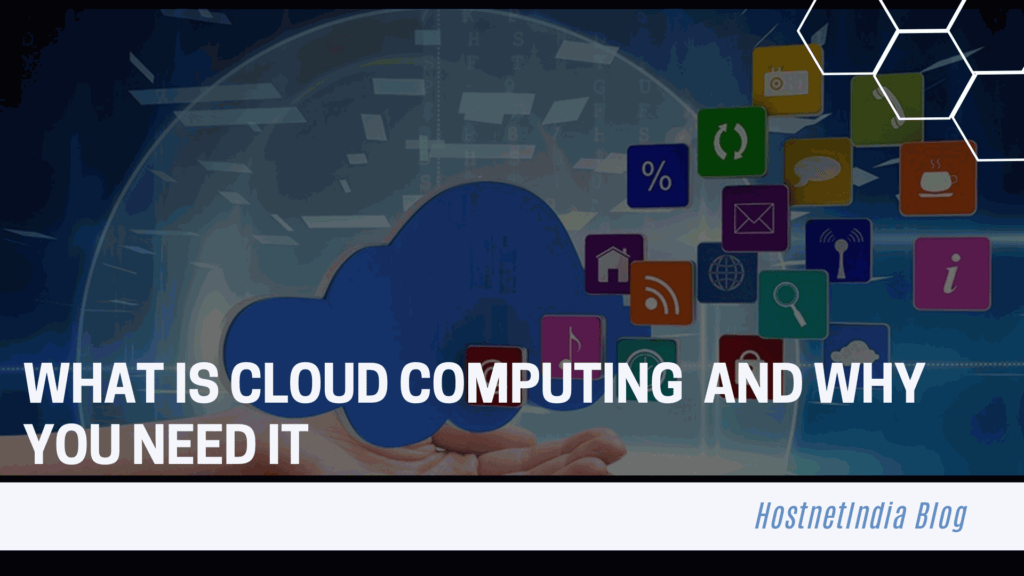What is Cloud Computing And Why You Need It

First of all, I would like to describe the basic meaning of cloud, by the way, most of you already know about Cloud computing but for common people understanding it is here:
What is Cloud Computing?
In cloud computing, a number of a dedicated server/physical servers act as dedicated server. So instead of a website being hosting on a single server, it’s hosted on a virtual partition of a server and draws its resources from a network of existing servers.
Read More – How do I set up a personal cloud?
Models of Cloud Computing
It is very obvious and known to most of you that cloud is a very wide concept, and it covers just about every possible sort of online service, but when organizations describe or explain computing, there are basically three models of cloud computing under consideration which are Infrastructure as a Service (IaaS), Software as a Service (SaaS), and Platform as a Service (PaaS).
Each has its own intricacies and hybrid cloud models, but today we’re going to help you to develop a basic and core knowledge of differences among them.
Infrastructure as a service (Iaas)
Infrastructure as a service is comprised of highly automated and scalable compute resources, complemented by cloud storage and network capability which can be self-provisioned, metered, and available on-demand.
When you use this type of cloud computing model your clients get direct access to their servers and their resources like they use the traditional dedicated server but have the ability to a much higher order of scalability.
Software as a Service (SaaS)
SaaS shifts the job of managing software and its deployment to third-party services. It is commonly purchased on a subscription model.
It is known that when you go for SaaS applications it reduces the cost of software ownership because you won’t require any technical staff to install, upgrade and manage it, as well as it also reduces the cost of licensing software.
Platform as a Service (PaaS)
PaaS functionality comes at a lower level than SaaS, typically providing a platform on which software can be developed, tested, and deployed.
PaaS is built on top of virtualization technology. Businesses can requisition resources as they need them, scaling as demand grows, rather than investing in hardware with redundant resources.
Future of Cloud service
As per Gartner and Foster’s research studies, India is an upcoming market for cloud computing usage, almost 60% of SME, MME, Large enterprises, and Govt and Semi Govt. organizations are moving towards cloud Infra for their web and Application hosting requirements.
“Gartner recommends to organizations that Start developing and implementing a cloud-first strategy now, with an emphasis on multi-cloud architecture. Organizations must advance the use of public cloud services to become the primary, prioritized and promoted deployment model”.
Read More – Top 5 Difference Between Cloud Server And Dedicated Server
Why you need Cloud service from Hostnetindia
SSD Cloud hosting is extremely reliable because it draws its resources from multiple different servers – if one server goes down the other servers fill the gap.
Also, cloud hosting is flexible and scalable with pure and faster Solid State drives, so it can grow with your website – if your site needs more resources, just request us to add them.
Hostnetindia has developed its own cloud computed solutions by developing and modifying the XEN platform, as XEN is a free platform hence does not require any license cost like Hyper-V or VM Vare, and is easy to scale vertically as well as horizontally.
Cloud computing not only Saves Infra costs but also gives customers N+1 redundancy, so that customer infra can go safe and give optimum utilization at bare minimum cost.
Apart from the above-mentioned core benefits, some others can be described as below:
- Rapid Provisioning
- Rapid Deployment
- Automated Setup process
- Un-matched Price VS Performance
- Uptime Guaranteed
- Scalability
- Resize and rebuild feature
Hostnetindia offers Cloud infrastructure in form of Linux cloud, windows cloud and cPanel cloud


 14 Best Windows Cloud Server Platform
14 Best Windows Cloud Server Platform  Advantages of Choosing Linux KVM-based VPS Hosting
Advantages of Choosing Linux KVM-based VPS Hosting  SAP Cloud Platform: Make your Business Smarter with the Power of Cloud
SAP Cloud Platform: Make your Business Smarter with the Power of Cloud  Cloud Security challenges you should know in 2021
Cloud Security challenges you should know in 2021  How Web API Integration Help To Development Cloud App?
How Web API Integration Help To Development Cloud App?